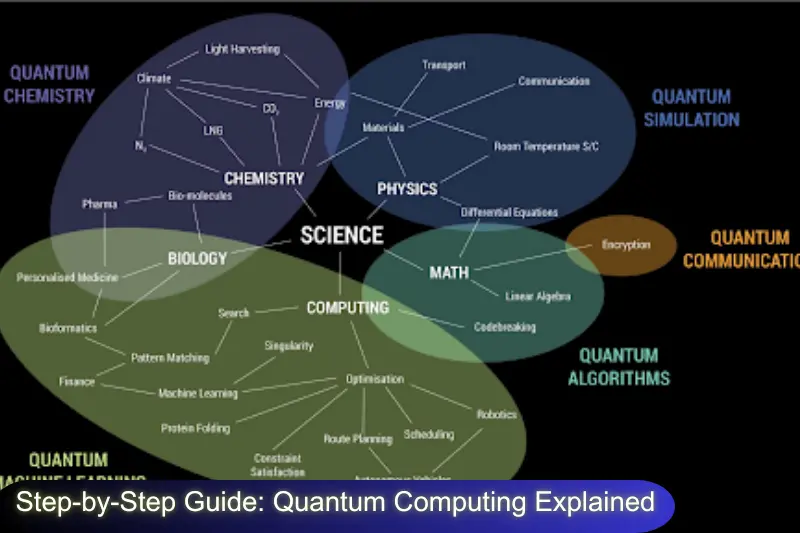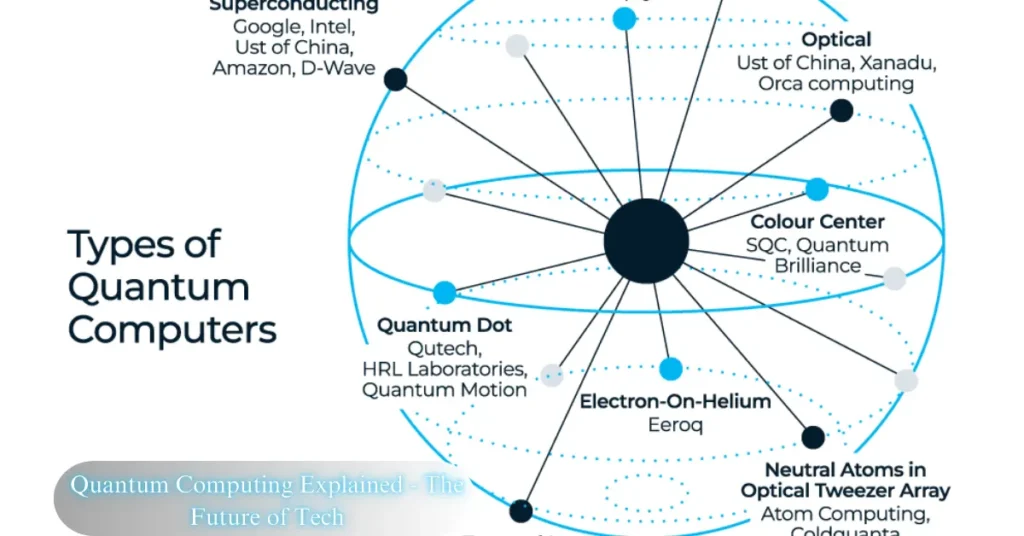Introduction
Quantum computing might sound like something out of a science fiction movie, Quantum Computing Explained but it’s a real and groundbreaking technology that’s set to change the way we solve problems. Unlike regular computers, which work with basic 0s and 1s, quantum computers use the fascinating principles of quantum mechanics to process information.
This new way of computing is incredibly powerful, opening doors to solving problems in seconds that would take even the fastest traditional computers years to figure out. From creating better medicines to improving artificial intelligence and even making our data more secure, quantum computing holds endless possibilities.
What is Quantum Computing Explained?

Quantum computing is a cutting-edge type of computing that uses the principles of quantum mechanics, the science that explains how particles like atoms and electrons behave. It’s very different from the computers we use today.
Traditional computers use bits to process information, which can either be a 0 or a 1. Think of bits as tiny switches that are either on (1) or off (0). Quantum computers, on the other hand, use qubits, which can be 0, 1, or both at the same time! This unique ability comes from a property called superposition.
You May Also Like It
Trendzguruji.me – Computer, Cyber, Awareness, SEO, Health & Beauty Guide
TrendzGuruji.me Cyber Insights Hub
“What’s Up with Emerald Gems? Let’s Talk
Why is Quantum Computing Important?
Quantum computing is more than just a technological breakthrough—it’s a tool that has the potential to reshape industries, solve complex challenges, and unlock new opportunities. Here’s why it matters:
Solving Complex Problems Faster
- Efficiency in Computation: Quantum computers can handle vast amounts of data and solve problems that traditional computers would take years to process.
- Real-World Impact: Tasks like optimizing supply chains, designing advanced materials, or cracking complex algorithms become achievable.
Advancing Science and Medicine
- Drug Discovery: Quantum computing can simulate molecular interactions, speeding up the development of life-saving drugs.
- Material Science: It helps scientists design new materials with unique properties, like superconductors or stronger alloys.
Revolutionizing Cryptography
- Breaking Encryption: Quantum computers could crack traditional encryption methods, making existing cybersecurity obsolete.
- Creating Unbreakable Codes: At the same time, quantum encryption methods like quantum key distribution can secure sensitive data.
Enhancing Artificial Intelligence and Machine Learning
- Faster Learning Models: Quantum computing can process and analyze data much faster, improving the performance of AI systems.
- Better Predictions: It can enhance machine learning algorithms for more accurate decision-making in fields like finance, healthcare, and climate science.
Optimizing Global Systems
- Supply Chain Optimization: Quantum computing can solve logistical challenges like route planning and resource allocation more efficiently.
- Financial Modeling: It helps in risk analysis, portfolio management, and market predictions by analyzing complex datasets quickly.
Tackling Global Challenges
- Climate Change: By modeling and analyzing environmental systems, quantum computers can aid in developing sustainable solutions.
- Energy Solutions: Quantum computing can optimize energy use and advance research in renewable energy technologies.
Step-by-Step Guide: Quantum Computing Explained

Quantum computing can seem complex, but breaking it down step by step makes it easier to understand. Here’s a straightforward guide to get you started:
Step 1: Understand the Basics of Traditional Computing
- Classical Bits: Traditional computers use bits to store and process information. A bit can either be a 0 or a 1.
- Linear Processing: These bits follow a step-by-step process to complete tasks.
Step 2: Learn the Concept of Qubits
What Are Qubits?
- Qubits are the building blocks of quantum computing. Unlike bits, they can exist as 0, 1, or both simultaneously, thanks to a property called superposition.
Superposition:
- Imagine spinning a coin—it’s not just heads or tails, but something in between. That’s what a qubit does, allowing quantum computers to explore multiple possibilities at once.
Step 3: Understand Quantum Entanglement
What Is Entanglement?
- When two qubits are entangled, the state of one qubit is directly linked to the state of the other, even if they’re far apart.
Why It’s Important:
- Entanglement allows quantum computers to process interconnected information in ways classical computers cannot.
Step 4: Explore Quantum Interference
What Is Interference?
- Quantum interference is used to amplify the correct solutions while canceling out incorrect ones.
How It Works:
- Think of it as tuning a radio to get a clear signal—quantum interference helps steer computations toward the best answers.
Step 5: Discover the Advantages of Quantum Computing
Parallel Processing:
- Quantum computers can process many calculations simultaneously, making them incredibly powerful.
Problem Solving:
- They excel in solving complex problems like cryptography, drug discovery, and optimization tasks.
Step 6: Understand the Challenges
Decoherence:
- Qubits are extremely sensitive to their environment, which can disrupt computations.
Error Correction:
- Maintaining stability and accuracy is a major hurdle in quantum computing research.
Step 7: Explore Real-World Applications
Cryptography:
- Breaking traditional codes or creating quantum-secure encryption.
Healthcare:
- Simulating molecules to design better drugs.
AI and Machine Learning:
- Enhancing algorithms for faster and more accurate predictions.
Step 8: Keep an Eye on Quantum Computing Developments
Tech Giants:
- Companies like IBM, Google, and Microsoft are leading the charge in quantum computing.
Quantum Programming Languages:
- Learn about programming languages like Qiskit or Cirq to understand how quantum algorithms work.
Advantages and Disadvantages of Quantum Computing
Quantum computing holds immense potential, but it also comes with challenges. Here’s a breakdown of its advantages and disadvantages:
Advantages
| Unmatched Computational Power Quantum computers can solve complex problems much faster than classical computers, especially in fields like cryptography and optimization. |
| Revolutionizing Science and Research Simulating molecules and chemical reactions at a quantum level accelerates discoveries in medicine, material science, and energy solutions. |
| Improved Machine Learning and AI Quantum algorithms enhance data analysis, making AI systems more efficient and accurate. |
| Optimization Across Industries Quantum computing helps optimize supply chains, logistics, financial modeling, and network systems. |
| Advancements in Cryptography It enables secure quantum encryption methods, such as quantum key distribution, which are virtually unbreakable. |
| Environmental Impact Modeling and solving environmental challenges like climate prediction and resource management become more precise. |
Disadvantages
| High Development Costs Building and maintaining quantum computers is expensive due to the specialized hardware and extreme conditions required (e.g., near absolute zero temperatures). |
| Decoherence and Instability Qubits are highly sensitive to their environment, leading to errors and short-lived calculations. |
| Lack of Practical Applications (Currently) Quantum computing is still in its early stages, and many real-world applications are theoretical or not yet feasible. |
| Risk to Current Cryptography Quantum computers can break traditional encryption methods, posing a significant security threat if not managed carefully. |
| Complexity of Development Designing quantum algorithms requires expertise in quantum mechanics, mathematics, and computer science, making it a highly specialized field. |
| Limited Accessibility Quantum computing is currently accessible only to large corporations, research institutions, and governments, limiting its broader impact. |
You May Also Like It!
Margie Washichek – A Comprehancive Guide – Veganov Trichy
Seargeoh Stallone – Complete Guide – Veganov Trichy
I Fear No One, But Respect Everyone. – Tymoff – Complete Guide – Veganov Trich”
Common FAQs About Quantum Computing
Quantum computing can feel overwhelming, but these FAQs will help simplify things for you:
What is quantum computing in simple terms?
How is quantum computing different from regular computing?
What are qubits?
What is superposition?
What is entanglement?
What are quantum computers used for?
Solving complex math problems (e.g., breaking encryption).
Simulating molecules for drug discovery.
Optimizing systems like supply chains or financial portfolios.
Advancing artificial intelligence and machine learning.
Can quantum computers replace regular computers?
Are quantum computers available to everyone?
Why are quantum computers important?
What are the challenges of quantum computing?
Keeping qubits stable (they’re very sensitive).
Correcting errors in quantum computations.
High costs of building and maintaining quantum systems.
Is quantum computing safe?
How can I learn more about quantum computing?
Conclusion
Quantum computing is an exciting technology that uses the power of quantum mechanics to solve problems traditional computers can’t handle efficiently. While it’s still developing, its potential to revolutionize fields like science, medicine, and cryptography is huge. Though there are challenges, quantum computing promises a future full of possibilities. Stay curious—this is just the beginning!
Bonus Points About Quantum Computing
Quantum Supremacy:
- Google achieved quantum supremacy in 2019, solving a problem in 200 seconds that would take a supercomputer 10,000 years!
Not for Everything:
- Quantum computers are great for specific tasks but won’t replace your laptop or smartphone anytime soon.
Quantum Cryptography:
- Quantum encryption, like Quantum Key Distribution (QKD), could make data transmission completely secure in the future.
Global Efforts:
- Countries like the US, China, and Germany are heavily investing in quantum computing research to gain an edge in technology and security.
Quantum Simulators:
- If you want to try quantum computing, platforms like IBM Quantum Experience let you experiment with real quantum computers online!
Environmental Benefits:
- Quantum computing could help develop renewable energy sources and optimize energy consumption to combat climate change.
The Future of AI:
- Quantum computing is expected to supercharge artificial intelligence, making machines smarter and faster than ever.
Still Evolving:
- We’re in the early stages of quantum computing, but its growth is rapid. It’s an exciting time to learn and be part of this transformative journey!
You May Also Like It!
Bestadvise4u.com News – Complete Guide – veganov Trichy
Tex9.net – Depth – Guide – Veganov Trichy
ICC 22 Jul 2022 West Indies Vs India Viewing Option – Veganov Trichy
Trendzguruji.me – Computer, Cyber, Awareness, SEO, Health & Beauty Guide
